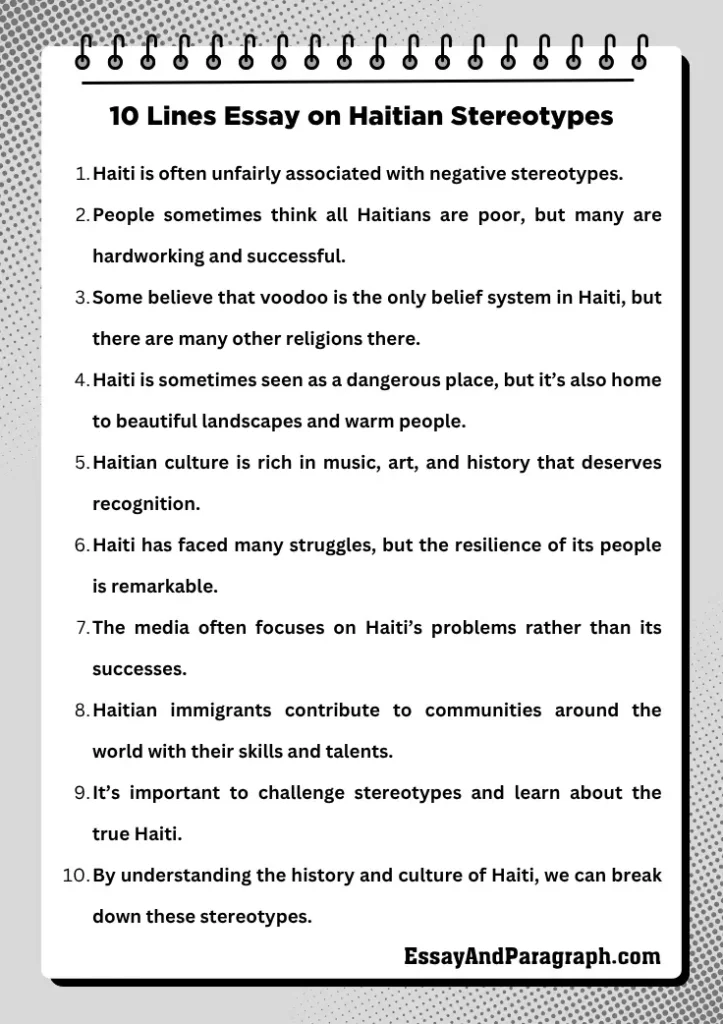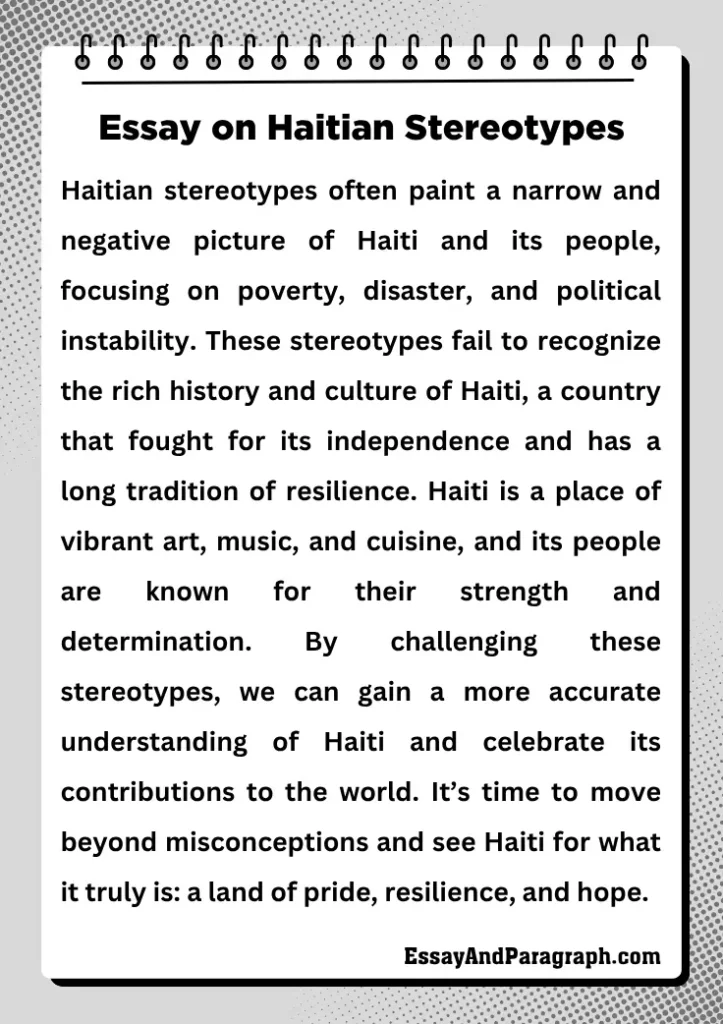Ever heard people talk about Haiti and immediately associate it with poverty, crime, or even voodoo? These stereotypes about Haitians can often be misleading and far from the reality of their culture, history, and achievements. Haitian people are incredibly resilient, proud, and rich in culture, and it’s essential to challenge these stereotypes. In this article, we will learn how to write an essay on Haitian stereotypes and explore how such misconceptions have shaped perceptions of the Haitian community.
10 Lines Essay on Haitian Stereotypes
Haiti is often unfairly associated with negative stereotypes.
People sometimes think all Haitians are poor, but many are hardworking and successful.
Some believe that voodoo is the only belief system in Haiti, but there are many other religions there.
Haiti is sometimes seen as a dangerous place, but it’s also home to beautiful landscapes and warm people.
Haitian culture is rich in music, art, and history that deserves recognition.
Haiti has faced many struggles, but the resilience of its people is remarkable.
The media often focuses on Haiti’s problems rather than its successes.
Haitian immigrants contribute to communities around the world with their skills and talents.
It’s important to challenge stereotypes and learn about the true Haiti.
By understanding the history and culture of Haiti, we can break down these stereotypes.

Essay on Haitian Stereotypes – 100 words
Haitian stereotypes often focus on negative perceptions such as poverty, crime, and voodoo. However, these stereotypes overlook the richness of Haitian culture, history, and the strength of its people. While Haiti faces challenges, it is also a nation with a deep cultural heritage, including art, music, and a vibrant language, Creole. Haitians are known for their resilience, overcoming adversity in the face of political turmoil and natural disasters. By understanding the true culture and history of Haiti, we can move beyond stereotypes and appreciate the positive contributions of its people.
Essay on Haitian Stereotypes – 150 words
Haitian stereotypes are commonly shaped by negative images such as poverty, crime, and voodoo. These portrayals ignore the true cultural depth and strength of the Haitian people. Haiti, while facing significant challenges, is a country with a rich history, diverse traditions, and a proud people. Haitians have a long legacy of resilience, overcoming struggles like natural disasters, political instability, and economic hardship. While voodoo is part of Haitian culture, it is only one aspect among many religions, with Christianity being the most widely practiced. The Haitian community worldwide also contributes significantly to their adopted countries, excelling in medicine, business, and education. Understanding Haiti’s complex history and diverse culture helps to challenge harmful stereotypes and reveals the positive impact Haitians have had on the world.
Essay on Haitian Stereotypes – 200 words
Stereotypes about Haitians are often tied to negative ideas of poverty, crime, and voodoo practices. These narrow views fail to capture the true essence of Haiti and its people. Despite the country facing economic challenges, Haiti has a rich cultural heritage that includes vibrant music, art, and a unique language, Creole. The Haitian people are known for their resilience, having fought for independence from France and endured hardships such as political unrest and natural disasters, like the 2010 earthquake. Haitians have continually rebuilt their communities, showing immense strength in the face of adversity.
It is also crucial to understand that voodoo is just one of many religious practices in Haiti, with Christianity being the dominant faith. The stereotype that all Haitians are involved in voodoo distorts the country’s diversity. Furthermore, Haitian immigrants contribute positively to countries around the world, particularly in fields like healthcare, education, and entrepreneurship. The Haitian community is diverse, and it is essential to acknowledge the successes and achievements of Haitians rather than reduce them to negative stereotypes. By doing so, we gain a more accurate and respectful understanding of the Haitian people and their culture.
Short Essay on Haitian Stereotypes – 250 words
Haitian stereotypes are often based on misguided perceptions that center around poverty, crime, and voodoo. While it is true that Haiti has faced significant challenges, such as economic instability, natural disasters, and political unrest, it is important not to define the entire nation by these hardships. The Haitian people have a deep cultural heritage that is rich in music, art, literature, and history. They are known for their resilience, as demonstrated by their fight for independence in 1804, which made Haiti the first independent black republic in the world.
Unfortunately, many people outside of Haiti are unaware of the country’s proud history and continue to perpetuate negative stereotypes. One such stereotype is the idea that all Haitians practice voodoo, but this is far from true. While voodoo is a part of Haitian culture, the country is predominantly Christian, and its population practices various religions, including Catholicism and Protestantism.
Haitians also make significant contributions to society globally, especially in fields like medicine, education, and business. Haitian immigrants in places like the United States have established successful careers and enriched their communities with their skills and knowledge. Instead of focusing on the negative aspects of Haiti, we should celebrate its diverse and resilient people. By challenging these stereotypes, we can gain a more respectful and accurate understanding of the Haitian community and the nation’s many accomplishments.
Long Essay on Haitian Stereotypes – 500 words
Haitian stereotypes are often rooted in misconceptions and oversimplifications of the country’s history and people. Commonly, Haiti is associated with poverty, crime, and voodoo, leading many to believe that all Haitians are trapped in cycles of violence and superstition. While these stereotypes are prevalent in the media, they fail to represent the true diversity and resilience of the Haitian people. Haiti, despite its struggles, is a country that boasts a rich cultural heritage and a history of incredible resilience and triumph.
Haiti’s fight for independence from France in 1804 made it the first independent black republic in the world, and this accomplishment alone challenges many stereotypes. However, the country’s economic isolation and political instability have overshadowed its achievements in the global narrative. Haitians have faced many challenges, including the devastating 2010 earthquake, which led to widespread suffering. Despite this, the Haitian people have shown remarkable strength in rebuilding their lives and communities. The resilience of Haitians is evident in their ability to survive and thrive in the face of adversity.
Another pervasive stereotype about Haitians is the idea that they are all involved in voodoo. While voodoo is an important aspect of Haitian culture and religion, it is far from the only belief system in the country. In fact, Haiti is predominantly Christian, with the majority of the population practicing Catholicism or Protestantism. The media often exaggerates the role of voodoo in Haitian society, which only perpetuates misunderstandings about the country and its people.
Moreover, Haitians are often depicted as poor and uneducated, which doesn’t reflect the full scope of the Haitian experience. Many Haitians, both in Haiti and abroad, have achieved success in various fields. Haitian immigrants, especially in countries like the United States and Canada, have made remarkable contributions in medicine, business, arts, and politics. These immigrants have become important members of their new communities, creating businesses, working in essential services, and enriching the cultural fabric of their adopted countries.
It is essential to move beyond these stereotypes and recognize the complexities of Haitian culture. The Haitian people have faced countless challenges throughout history, yet they have remained strong, creative, and determined. Haiti’s cultural richness, from its music and art to its unique Creole language, provides a deeper understanding of the country and its people. Rather than focusing on Haiti’s difficulties, we should celebrate its successes and the spirit of its people.
By challenging these stereotypes, we can foster a more accurate and respectful understanding of Haiti. It is important to view Haitians not as victims of poverty and misfortune, but as a resilient, proud, and diverse people who continue to contribute to the world. Learning about Haiti’s history and culture allows us to break free from the limitations of these negative stereotypes and appreciate the true depth and beauty of this nation and its people.
FAQs
1. Why are Haitian stereotypes harmful?
Haitian stereotypes are harmful because they create a limited and inaccurate portrayal of the country and its people. These stereotypes often focus on negative aspects like poverty and violence, overshadowing the rich culture, history, and accomplishments of Haitians. This leads to misunderstandings and perpetuates discrimination.
2. How can we challenge Haitian stereotypes?
We can challenge Haitian stereotypes by educating ourselves about the true history and culture of Haiti. It is important to look beyond the negative portrayals in the media and recognize the achievements of Haitians in various fields. Sharing positive stories and supporting Haitian communities can also help combat stereotypes.
3. What are some common Haitian stereotypes?
Common Haitian stereotypes include ideas that all Haitians are poor, uneducated, and involved in constant disasters. These stereotypes often ignore the country’s rich history, vibrant culture, and the resilience of its people. It is essential to recognize that Haiti has made significant contributions to global culture and history.
4. How does Haiti’s history challenge stereotypes?
Haiti’s history challenges stereotypes by showcasing its independence from colonial powers and its role as the first black republic in the world. Haiti’s struggle for freedom and its accomplishments in the face of adversity are proof of the strength and resilience of its people. These historical milestones demonstrate that Haiti is much more than the negative stereotypes often associated with it.
5. What cultural contributions have Haitians made?
Haitians have made significant cultural contributions in music, art, and cuisine. Haitian music, such as Kompa and Rara, is enjoyed worldwide, and the country’s art is recognized for its vibrancy and emotional depth. Haitian cuisine, with its unique flavors, has also become popular internationally. These cultural contributions highlight the richness of Haiti’s heritage.
Top 5 Quotes on Haitian Stereotypes
“Haiti is a country of strength, resilience, and beauty, not defined by its struggles but by the spirit of its people.”
“The true Haiti is not in the headlines, but in the hearts of those who have persevered.”
“Stereotypes are the shadows of ignorance; the light of truth shows Haiti as a land of possibility.”
“Behind every stereotype is a story waiting to be told; Haiti is full of stories of hope and triumph.”
“The Haitian spirit cannot be defined by poverty or disaster, but by the culture and pride of its people.”
Summary on Haitian Stereotypes
Haitian stereotypes often paint a narrow and negative picture of Haiti and its people, focusing on poverty, disaster, and political instability. These stereotypes fail to recognize the rich history and culture of Haiti, a country that fought for its independence and has a long tradition of resilience. Haiti is a place of vibrant art, music, and cuisine, and its people are known for their strength and determination. By challenging these stereotypes, we can gain a more accurate understanding of Haiti and celebrate its contributions to the world. It’s time to move beyond misconceptions and see Haiti for what it truly is: a land of pride, resilience, and hope.











